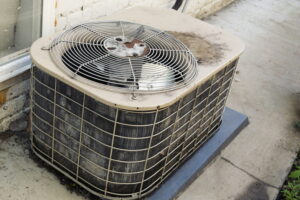If you’ve lived through a summer in Nashville before, you know how hot it can get. Try to imagine living here if you didn’t have an air conditioning system to cool your home. Not a pleasant thought!
But you do have a central AC for your house. Good so far! Now ask yourself if you think that AC is coming to the end of its service life. You don’t want to head into the heat of summer with a failing air conditioner—you’ll end up trapped on a hot day with no cooling, scrambling to arrange for an air conditioning replacement in Nashville, TN.
We don’t want you to go through that, so we’re going to look at some of the ways to tell you’ve got an air conditioner that’s ready to retire.
The air conditioner is too old.
The average estimated service life of a central AC is from 10 to 15 years, although that number will go down if the unit has gotten regular professional maintenance. (Helpful tip!) When your AC is in this range, pay special attention to other signs the unit is struggling.
If your AC is older than this, we suggest you go ahead and schedule a new installation. You’ve already got a good service life from the unit, now it’s time to take advantage of the better energy efficiency of the newest ACs.
The AC makes a lot more noise than before.
Modern air conditioners are designed to make as little noise as possible. You’ll still hear the running of motors and fans, but it shouldn’t be louder than the sound of a normal conversation. When an air conditioner wears down to the point it may soon fail, it will often make more noise than before, with extra sounds like grinding and clattering thrown in. Have HVAC pros take a look at your noisy AC right away to see what’s wrong and if it needs replacement.
Energy bills have skyrocketed.
When an air conditioner reaches the final stages of its service life, the strain and wear will cause it to work harder, draining even more electricity. You’ll see this appear on your utility bills. Don’t ignore an energy spike like this! It might be the AC waving a white flag.
The AC needs more frequent (and more expensive) repairs.
If you’re arranging to have the AC repaired every year, that is far too often. You’re putting way too much money into trying to keep the air conditioner running; it’s better to put that money toward installing a new unit. Watch out for the cost of these repairs. For example, don’t pay for any repair that costs more than half the price of getting a new air conditioner.
There are hot spots around the house.
The AC should provide an even spread of cooling around your home. If there are hot spots, that can mean the unit is losing its cooling capacity because it’s starting to fail. We recommend calling our team for an assessment of the AC to see if it’s ready for replacement.


